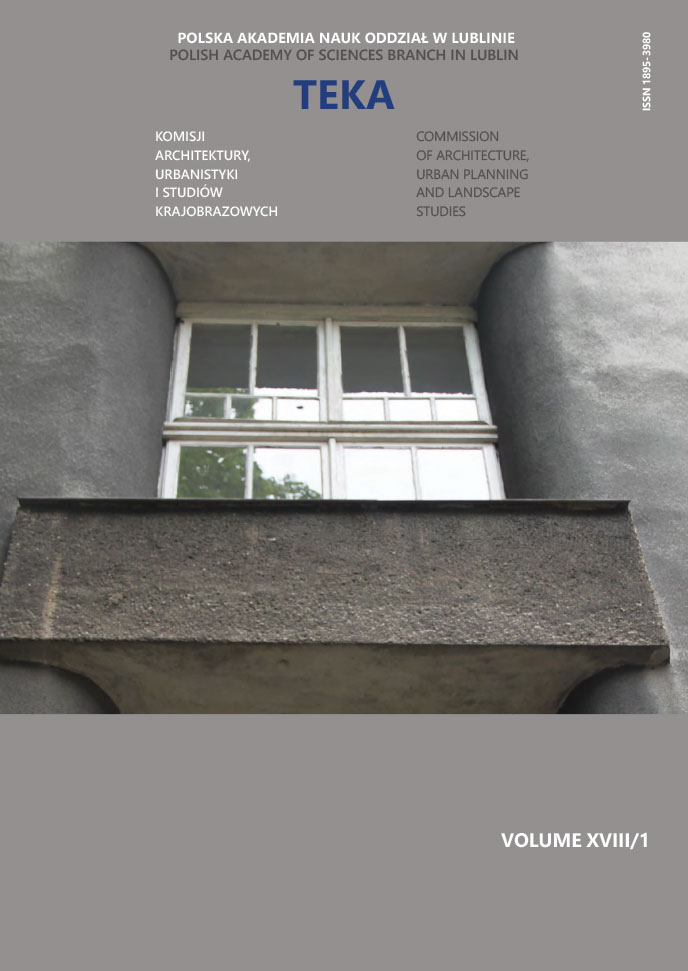Neon signs in urban space, yesterday and today. A case study based on Lublin
Article Sidebar
Issue Vol. 18 No. 1 (2022)
-
Architecture of nursing homes in selected European countries
Rafał Strojny7-17
-
Strategies for creating photographic objects – an attempt at classification
Krzysztof Ślachciak18-27
-
Affordable modul house – modernity and tradition
Andrzej Tokajuk28-33
-
Neon signs in urban space, yesterday and today. A case study based on Lublin
Agnieszka Chęć-Małyszek34-47
Archives
-
Vol. 20 No. 3
2024-12-27 7
-
Vol. 20 No. 2
2024-12-27 7
-
Vol. 20 No. 1
2024-12-27 8
-
Vol. 19 No. 2
2023-12-29 11
-
Vol. 19 No. 1
2023-12-19 13
-
Vol. 18 No. 4
2022-12-30 5
-
Vol. 18 No. 3
2022-12-27 5
-
Vol. 18 No. 2
2022-12-27 5
-
Vol. 18 No. 1
2022-12-27 4
-
Vol. 17 No. 4
2021-12-30 11
-
Vol. 17 No. 3
2021-12-30 9
-
Vol. 17 No. 2
2021-12-30 8
-
Vol. 17 No. 1
2021-12-30 8
-
Vol. 16 No. 4
2020-12-30 11
-
Vol. 16 No. 3
2020-09-30 10
-
Vol. 16 No. 2
2020-06-30 11
-
Vol. 16 No. 1
2020-03-31 10
Main Article Content
DOI
Authors
Abstract
During the communist era, neon signs were something Poland could boast of. At that time, the streets were drowning in luminous advertising, which was impossible not to notice. Recent years have brought disastrous quality of urban advertising and the prevailing arbitrariness has contributed to the degeneration of urban spaces. Colourful neon signs once prevailed in Polish streets, serving as a model example of advertising whose impact was crucial in the perception of urban space. Today, neon signs are considered works of art, and the most valuable achievement of Polish 20th century design, which we can mainly admire today in museums. In the last decade, we have been reminded of their existence and efforts have been made to save them and return them to urban spaces. The purpose of the article is to draw attention to the extraordinary value of neon signs as an important building block of urban space and to highlight their artistic and social functions. The undertaken research includes material on neon signs from the communist era as well as those newly designed, based on the city of Lublin.
Keywords:
References
https://pl.wikipedia.org/wiki/Neon_(reklama),
Sural, A., Warszawskie neony (Sztuki Wizualne). Available online: https://culture.pl/pl/artykul/warszawskie-neony, [accessed: 16. 05. 2014].
Mruk, J., Od Berlina do Szanghaju. Neony w Warszawie po II wojnie światowej. Available online: https://www.historiaposzukaj.pl/wiedza,historiomat,1293,historiomat_neony_w_warszawie.html.
Molecki, B., Neony Dworca Głównego we Wrocławiu, „Świat Kolei” no 12/2010, p. 36−37.
Szlachetka, M., Lubelskie neony w czasach PRL. Piękny i niezapomniany jaśnie pan neon, Available online: https://kurierlubelski.pl/lubelskie-neony-w-czasach-prl-piekny-i-niezapomniany-jasnie-pan-neon/ar/8111405 [accessed: 20. 09. 2015].
https://pl.wikipedia.org/wiki/Luminofor.
M. Szlachetka, Lubelskie neony w czasach PRL. Piękny i niezapomniany jaśnie pan neon. Available online: https://kurierlubelski.pl/lubelskie-neony-w-czasach-prl-piekny-i-niezapomniany-jasnie-pan-neon/ar/8111405 [20.09.2015].
DeBord, S., & Grade, V.A.I., Neon & Luminescence: The Illuminated Meme, Charlotte Teacher Institute.
Jaworski, A., Language Ideologies in the Text-Based Art of Xu Bing: Implications for Language Policy and Planning. In: Tollefson, J.W., Pérez-Milans, M. (Eds.), The Oxford Handbook of Language Policy and Planning. Oxford University Press, Oxford 2018, pp. 677−703.
Kwok, S.H., Hong Kong Neon Sign Artworks — Vol. 1 Restaurant. 2021.
Theng, A.J., Precarity and Enterprising Selves: The Resemiotization of Neon Language Objects. Discourse, Context & Media, 39(3):100462, 2021.
Hall, P.A., Of neon, road signs, and head shapes: A case for generative criticism. In The Routledge Companion to Criticality in Art, Architecture, and Design (pp. 315−329). Routledge 2018.
Kane, C.L., Neon visions: from techno-optimism to urban vice. Visual Communication, 1470357220912457. [accessed: 09. 06.2020].
Jagodziński, Z.K., The only such Museum in Poland – the Neon Museum. Muzealnictwo, 2013, 54, 146−151.
Balcerzak, A., “The Charm of the PRL”. Memory Culture, (Post) Socialist Nostalgia and Historical Tourism in Poland. Slovak Ethnology/Slovensky Narodopis 2021, 69(2).
Ribbat, C., Tomorrow’s Neon: A History Retrieved from. Available online: https://www.neonsigns.hk/neon-in-visual-culture/tomorrows-neon-a-history/?langen; [accessed: 30.07.2013].
Lou, J.J., Shop sign as monument. Linguistic Retrieved from Landscape 2 (3), 2016, s. 211−222.
Stern, R., The new let there be neon. ST Publications, Cincinnati 1996.
Bretan, J., The Story of Warsaw’s Love Affair with Neon; Available online: https://theculturetrip.com/europe/poland/articles/the-story-of-warsaws-love-affair-with-neon/, [accesed:18.11.2019].
Maciejewska K., Neony PRL: rozbłyski w ciemnych czasach. Available online: https://magazif.com/design/neony-reklamowe-stare-neony-prl/, [accessed: 21.06.2018].
Lublin Wojciecha Turżyńskiego – Krakowskie Przedmieście i Plac Litewski; Available online: https://teatrnn.pl/lublin1918-2018/lublin-wojciecha-turzanskiego-krakowskie-przedmiescie/.
History of the cinema. Available online: https://pl.wikipedia.org/wiki/Kino_Kosmos_w_Lublinie#Lata_2009_.E2.80.93_2012_i_rozbi.C3.B3rka_budynu.
Szydłowki, J., Dybek A., Neon z kina Kosmos zabłyśnie w Noc Kultury w Lublinie, Available online: http://www.dziennikwschodni.pl/lublin/n,1000009222,neon-z-kina-kosmos-zablysniew-noc-kultury-w-lublinie.html. [accessed: 03.06.2013].
Wandas, M., Gdzie się podziały lubelskie neony? Available online: https://publicystyka.ngo.pl/gdzie-sie-podzialy-lubelskie-neony [accesed: 28.12.2015].
Neon Brejdaki, Available online: https://tpienczak.com/studio/neon-brejdaki/.
Prus, K., Neonowe popiersie greckiego boga Apolla zawisło na Centrum Kultury w Lublinie, Available online: https://www.dziennikwschodni.pl/lublin/nowy-blask-neonowy,n,1000290704.html [accessed: 15.06.2021].
Kane, C.L. Neon visions: from techno-optimism to urban vice. Visual Communication, 1470357220912457.; 2020. Available online: https://doi.org/10.1177/1470357220912457.
Article Details
Abstract views: 486
License

This work is licensed under a Creative Commons Attribution-ShareAlike 4.0 International License.


